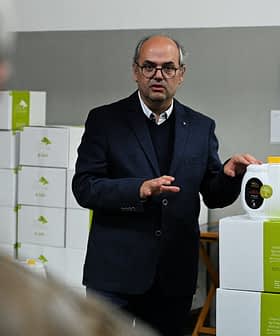Portugal Seizes Adulterated Olive Oil in Raid
Portuguese food standards y agency ASAE seized 6,000 liters of fake olive oil from a company in the town of Penamacor.
Portuguese food standards agency ASAE seized 6,000 liters of fake olive oil last week from a company in the town of Penamacor, some 270 kilometers northeast of the country’s capital, Lisbon, ASAE said in a statement.
According to ASAE, which is Portugal’s agency to inspect and enforce food standards and safety from manufacturing and import through to point of sale, around 6,000 liters of fake olive oil were seized as part of an operation code named “Golden Oil III” last month.
See Also:Articles on Olive Oil Fraud
In the raid, a total of 3,400 liters of the false oil was found decanted into small and large bottles and investigators from ASAE’s National Information and Criminal Investigation Unit witnessed an oil blend being labeled as olive oil. It also seized a tank filled with 2,400 liters of lampante oil.
In all the seized products had a market value of some €30,000 ($31,809).
“In the course of the investigation of the entire supply chain products were seized at several retailers and wholesalers located in different council areas and criminal proceedings were initiated for falsified goods and foodstuffs, and the packager is a repeat offender of these same crimes,” the INE statement said.
The importer and packaging company was found to be mixing olive oil with other vegetable oils, pouring it into bottles and labeling at as virgin olive oil, the agency said.
Operation Golden Oil III, as the name suggests, follows Operations Golden Oil I and II carried out by ASAE in previous years.
In August of this year, Brazilian consumer report magazine Proteste in a test of 19 olive oil brands sold in the country’s supermarkets found three brands of purportedly Portuguese olive oil were falsified.
The olive oil of the Pramesa, Figueira da Foz and Tradição brands were found to be a mixture of olive oil and other vegetable oils. Another three brands (Qualitá, Beirão, Carrefour Discount and Filippo Berio) were labeled as extra virgin olive oil but were found to be virgin olive oil.
Production of olive oil hit a 75-year high of 765,000 tons in Portugal in 2015 and olive oil production in 2016 is expected to hit a 50-year high, according to the country’s National Statistics Institute (INE).
In recent years new irrigated expanses of olive groves have been planted in the southern Alentejo region, which produces more than 75 percent of the country’s olives, meaning that production is now less reliant on annual rainfall for a successful harvest.








